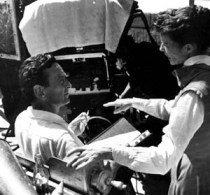It would, no doubt, come as a surprise to the makers of Cairo Time that their film is no more than an odd duck in a lowly film genre, the chick flick. Short on content and long on mood, the movie obviously means to transcend its niche, but Cairo Time merely adapts the chick flick formula for the mature set. Call it a hen flick.
Because it’s about adult love, and for other reasons, including the echo in the titles that may well have been intentional given the similarities in the films, Cairo Time reminded me of Summertime, the superb David Lean film with Katharine Hepburn (reviewed on another page). Both films use their locations (Cairo and Venice) to a seductive extent, and both tell stories about star-crossed love. The heroine in Cairo Time is even named Juliette.
Although the views of Venice in 1955 in Summertime helped transform that city into the tourist circus it is today (about 20 million visitors annually), the love story between Hepburn and Rosanno Brazzi did not require Venice. It had its own drama, its own story arc, with Hepburn’s character, Jane, evolving in a way that was involving. In stark contrast, Cairo is crucial to Cairo Time. Scenes of the city—day and night, indoors and out, in chaos or solitude—are what kept me watching because, sadly, the love story comes close to being a vacuum: two middle-aged people meet, are attracted to each other, and ultimately part—a parting that is never in doubt.
Thousands of love stories follow the Romeo & Juliet formula, of course, which is universal and timeless—Paris & Helen, Ruth & Boaz, the Butterfly Lovers, Ohi’a and Lehua, Prince Charming and Princess Sleeping Cinderella Snow. And a hefty percentage use war as their background. In Cairo Time, the Middle East conflict is treated much the way World War II is Casablanca, to name the most famous war romance movie, and one of the best if only because the war is central to everyone’s motivation. War is a great dramatic setting, of course, though it is more than a bit callous to use war to sell a love story.
And story is the operative word. Cairo Time settles for delivering a mood. The forbidden Arab Romeo for our American Juliet is an Egyptian called Tariq Khalifa, a situation that screams star-crossed tragedy. In this 2009 movie, however, the cultural divide is not what crosses them up; her marriage does, which is one of the reasons the story stays solidly in chick-flick territory. The MidEast conflict, not to mention Bush and Cheney’s “war on terror,” is nothing more than background context.
But back to David Lean, briefly, because few directors were better at delivering love stories that don’t descend to formula. Summertime is only one of his triumphs in the realm of adult love stories. His best, Brief Encounter, is a masterpiece; indeed, it is the romantic film by which all others can be measured, and I’m not the only one who thinks so: link, link, link. Each of Lean’s love stories are strongly flavored and exquisitely felt. The Passionate Friends is perhaps the least known. Yet another, Madeleine, differs from the other three because it’s based on a true story, and the female lead is meant to be young and marriageable (though she is played by Ann Todd at age forty-four).
Cairo Time reminded me of another recent hen flick, It’s Complicated, the 2009 Meryl Streep film that is as bad as its title. I took It’s to task here (again, comparing it to Summer-time) because the director, Nancy Myers, is as callow and formulaic as any working director I can think of, man or woman. Cairo Time also has a woman at the helm: Ruba Nadda, a Canadian who is not as shallow or predictable as Myers, but is still orders of magnitude behind Lean. It isn’t fair, I realize, to judge film directors (or any profession, except perhaps the oldest) by their gonads—though John Huston and his manly ilk bear examination, and I hold that Ida Lupino was so far ahead of the rest of her gender that she merits special acknowledgment. But when two movies are as similar as It’s Complicated and Cairo Time—both directed by women, both love stories involving married women tempted to adultery—it would be cowardly to withdraw into politically correct self-censorship.
From what I have seen of their works so far, neither Myers nor Nadda know how to turn “Lights, camera, action!” into cinema. In It’s Complicated, Myers delivers 100% conventional movie-making, stagey and chatty, with the women clucking about what’s missing from their over-privileged lives. Myers’ very particular failure is her inability to make anything but the most superficial attempt at observing and revealing the genuine moral quandary women face when they suddenly yearn for a forbidden man (the same quandary, let us remember, that men face when they want a taste).






